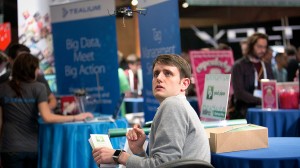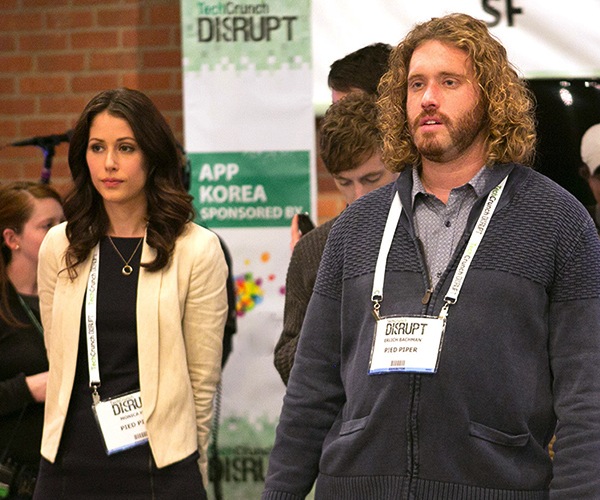Television Review: “Silicon Valley” Gets the Algorithm Right
The creator of the series, Mike Judge, and his team have gone to great lengths to sweat the details of the corporate landscape of San Jose and its environs. Right from the start, Silicon Valley rang true.

The Pied Piper team. (L. to R., Kumail Nanjiani, Thomas Middleditch, Martin Starr, Josh Brener, T. J. Miller)
By J. R. Carroll
The initial season of HBO’s Silicon Valley came to a conclusion with one of the hoariest of plotlines, the heroic genius devising a brilliant solution at the last minute and saving the day. But it is a measure of how deeply the show has dug into the fine details of the software development world that, in the spur-of-the-moment presentation by the protagonist, we see fly by in rapid succession references to father of information theory Claude Shannon, Huffman coding (a probabilistic system for encoding data), and the Liv-Zempel lossless compression algorithm. (Even the fictitious “Weissman score” that’s posited as the definitive benchmark for data compression was, in fact, created explicitly for the show by the very real Stanford professor Tsachy Weissman and his grad student, Vinith Misra.)
For someone with a technical background—and we know you’re out there—this, and the entire series, was beyond refreshing. Hollywood’s representations of software have largely ranged from the ridiculous to the jaw-droppingly ridiculous. (A typical scenario: Someone walks up to a computer terminal, types in a handful of characters, and breezily declares, “We’re in.”) From the perspective of the denizens of the industry’s corner offices, though, these are Nerd World problems. (And you don’t have to be a nerd to enjoy Silicon Valley—see Gerald Peary’s earlier review for the Arts Fuse.)
Fortunately, a hallmark of an HBO series has been the willingness to allow the characters to speak—in an unfiltered way—the language of the world they inhabit. (One of the many pleasures of Treme was hearing characters employ the technical language of music right alongside the gritty argot of hustling for gigs and recording sessions.) The denizens of Silicon Valley are positively marinated in the start-up-and-cash-out ethos of entrepreneurial engineers, commingling technical jargon with the buzzwords of dealmaking.
The creator of the series, Mike Judge, and his team have gone to great lengths to sweat the details of the corporate landscape of San Jose and its environs. (Did you catch the balloon with the Napster logo that rapidly deploys and deflates during the opening credits?) “Houli”—transparently modeled on Google, right down to the on-site games and freebie refreshments, and led by the egotistical and charismatic Gavin Belson (Matt Ross)—is made up, but other facets of that world are brought into the plotlines unadulterated. Yes, there really is an agile software development methodology called “Scrum,” with its story cards and burndown charts, TechCrunch (and its “Disrupt” competition) is a real thing, and even driverless cars show up, only to be subjected to a merciless takedown by the show’s writers.
I spent more than two decades in the software engineering world, and right from the start, Silicon Valley rang true in terms of the personality types depicted. Within fictitious start-up Pied Piper you meet the deathly shy but brilliant Richard Hendriks (Thomas Middleditch), the arrogant Canadian satanist Bertram Gilfoyle (Martin Starr), the pragmatic and resolutely unsentimental Dinesh Chugtai (Kumail Nanjiani), the genial second-stringer Nelson Bighetti (Josh Brener), nicknamed “Big Head,” and the number-crunching stranger in a strange land, Donald “Jared” Dunn (Zach Woods). Eccentric as some of the leading lights of the software world may be, though, I don’t think I ever encountered anyone quite as over-the-top as Erlich Bachman (T. J. Miller), the bong-puffing, ‘shroom-gobbling proprietor of the incubator where Pied Piper dwells, who did well enough as an engineer to cash out and now fancies himself a visionary a la Steve Jobs.
What also rings true, unfortunately, is the dearth of women, and their general absence has not gone unremarked upon in the blogosphere. The female characters largely inhabit the margins of this world, engineering oddities at best and sexual accessories at worst, reflecting a systemic misogyny that is still too prevalent. There is one notable exception, the surnameless Monica (Amanda Crew), the assertive, industry-savvy assistant who functions as ambassador to the world for Pied Piper’s reclusive primary investor, Peter Gregory (Christopher Evan Welch). Modeled in part on Yahoo CEO Marissa Mayer (who was brought in to turn the company around before it joined AOL and MySpace in the bit bucket, and is having some success), Crew’s character skillfully navigates her way among the technobros and vulture capitalists, and is notably sympathetic toward the idealistic and woefully naive Richard.
A genuine rarity is the way Silicon Valley provides a view into the way the minds of the truly brilliant operate. In one episode, Gregory cryptically asks to have someone buy one of every item on the Burger King menu. He isn’t really hungry, or interested in the dubious variety of BK’s offerings; no, his attention is drawn to the sesame seeds atop the buns, prompting him to put money into sesame seed futures in anticipation of a projected poor crop.
And in the season finale, Richard, a kindred spirit, is inspired to devise a new compression algorithm by a beyond-inane discussion (and the whiteboard diagrams in generates) that can be termed, in all senses of the word, masturbatory.
HBO has greenlighted a second season for Silicon Valley, but the show’s writers face an unusual and sad circumstance that they will have to navigate: Christopher Evan Welch died of lung cancer last December. (Viewers may have noticed his absence from the final three episodes of this season.) Will the Gregory character continue as a disembodied absentee investor, or will his death be acknowledged? If the latter, who will inherit his billions (and his investment in Pied Piper), and will the Pied Piper interest be sold to a new investor?
And what will be the role of Monica? Will an anomalous romantic involvement with Richard, intimated in the final episode, blossom? Will she finally get a last name? And might it turn out to be … Gregory?
J. R. Carroll served as Program Director of Columbia University’s WKCR-FM back in the early 1970s, and reviewed jazz, classical, world, roots and rock music for Crawdaddy and other long-departed publications. He was a contributor to the late, lamented WBUR Online Arts site and has been writing on jazz and other topics for the Arts Fuse since 2007.



